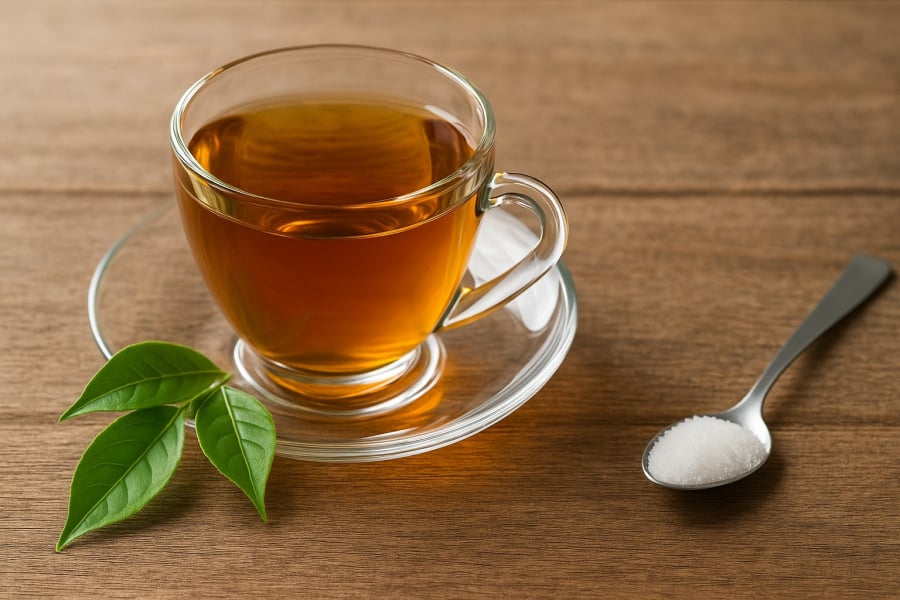Tea is More Than Just a Beverage, It’s a Culture and a Health Booster
For centuries, tea has been an integral part of Vietnamese culture. A cup of tea often accompanies intimate conversations, family gatherings, or simply a moment of tranquility to unwind at the end of the day. Drinking tea is not just a habit but also a beautiful traditional cultural aspect.
However, what’s even more fascinating are the health benefits that a cup of tea offers. Apart from being a relaxing beverage, tea – when consumed appropriately – can also protect your heart from dangerous complications such as stroke and cardiovascular disease.

Large-Scale Study: Unsweetened Tea Reduces Cardiovascular and Stroke Risk
Recently, a large-scale study published in the International Journal of Cardiology: Cardiovascular Risk and Prevention provided compelling scientific evidence supporting the daily habit of tea drinking.
Conducted by scientists at Nantong University in China, the study tracked 177,810 healthy adults in the UK over 12 years. The participants had an average age of around 55 at the start of the research.
During the observation period, the researchers recorded over 15,000 cases of various cardiovascular conditions. However, the data analysis revealed a notable conclusion: those who regularly consumed unsweetened tea – up to a maximum of 2 cups per day – had a significantly lower risk of cardiovascular diseases compared to non-tea drinkers or those who drank tea with added sweeteners.
Here are the details:
- 21% reduced risk of heart failure
- 14% reduced risk of stroke
- 7% reduced risk of coronary artery disease
This sends a crucial message: tea can be a natural “medicine” for cardiovascular health – but only if consumed in its pure form, without adding sugar or artificial sweeteners.
Why Does Sugar Diminish the Benefits of Tea?
Tea, especially green and black tea, contains high levels of polyphenols – powerful antioxidants that help protect cells, reduce inflammation, improve blood flow, and maintain blood vessel function. However, when sugar or sweeteners are added to tea, the biological reactions in our bodies can be negatively affected.
Sugar not only reduces the effectiveness of polyphenols but is also associated with issues like insulin resistance, elevated blood fat levels, and metabolic disorders – all of which increase the risk of cardiovascular problems. Additionally, daily sugar consumption, even in small amounts like in a cup of tea, can contribute to the development of chronic conditions such as type 2 diabetes, hypertension, and dyslipidemia over time – all of which lead to cardiovascular complications and stroke.

How to Drink Tea the Right Way – For Health and Relaxation
Based on the study’s findings, drinking tea the right way is one of the simplest and most accessible choices to improve cardiovascular health. However, to maximize the benefits, keep the following in mind:
- Prioritize unsweetened tea: If you’re accustomed to sweetness, gradually reduce the amount of sugar over time. Eventually, you’ll appreciate the true flavors of tea – subtle and refreshing.
- Choose the right tea: Green tea, black tea, oolong tea, and others all have health benefits, so it’s a matter of personal preference. Just make sure to choose pure tea without added flavors or preservatives.
- Avoid drinking tea on an empty stomach or too late at night: Tea can cause stomach irritation if consumed when hungry, and the caffeine in tea may disrupt sleep if consumed too close to bedtime.
- Don’t overdo it: The recommended intake is 1–2 cups per day. Excessive tea drinking can lead to mineral imbalances and digestive issues.
Small Change, Big Impact
In our busy lives, not everyone has the time or motivation to follow strict diets or exercise routines. However, a small change like drinking unsweetened tea daily can have a lasting positive impact on cardiovascular health.
And the best part? This habit doesn’t require much effort. Just a cup of tea in the morning or afternoon can help you relax and protect your heart every day.
The Magic of Perilla Leaf Water: A Tonic with Many Benefits, But Beware of These 3 Pitfalls
Introducing the ultimate health tonic – perilla leaf water. A traditional remedy with a modern twist, this powerful elixir is packed with nutrients and antioxidants that boost your health and vitality. But many are still unaware of its full potential and how to unlock its benefits. Discover the secrets to harnessing the power of perilla leaf water and take your wellness to new heights.





































